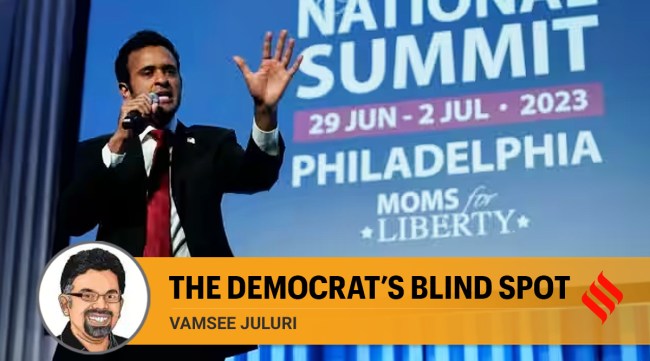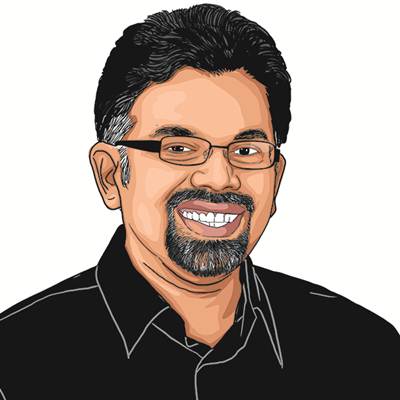Opinion Vamsee Juluri writes: Liberal America’s refusal to recognise racism against Hindus is pushing them away from Democrats
Many avowedly anti-racist white liberals in America find it convenient to forget that the Hindu immigrants they freely denigrate as fascists happen to be people of colour who have no way of escaping the physical markings and vulnerabilities of race
 Republican Presidential candidate Vivek Ramaswamy was asked recently about his spiritual beliefs. He identified himself unhesitatingly as a Hindu and explained that both Christianity and Hinduism believe in a true God who resides in everyone. (Photo: AP)
Republican Presidential candidate Vivek Ramaswamy was asked recently about his spiritual beliefs. He identified himself unhesitatingly as a Hindu and explained that both Christianity and Hinduism believe in a true God who resides in everyone. (Photo: AP) Two events suggesting the quickly changing place of Hindus in American politics happened last week. One involved a Republican, and the other, a Democrat.
Republican Presidential candidate Vivek Ramaswamy was asked recently about his spiritual beliefs. He identified himself unhesitatingly as a Hindu and explained that both Christianity and Hinduism believe in a true God who resides in everyone. Some differences in nuance, but the “punchline was the same”. It was a Gandhian sentiment, but quite post-Gandhian too. Ramaswamy drew a sharp contrast between “religions like ours which have withstood the test of time,” and progressive social justice movements (“wokeism”), which he dismissed as “cults”.
Religion and politics are in a complex mix in today’s polarised America. Perhaps Ramaswamy’s words hint at cultural realignments in years to come, or not. It is evident, though, a moment has already come when a non-Christian Republican candidate feels confident that he needn’t change his name or religion to please Christian voters as others might have done in the past.
On the other hand, the relationship between the Democratic party and Hindus makes for a very different story. This is where the second incident comes in.
On July 4, an Indian family attending an Independence Day fair in a deeply “Blue” county in California was confronted by a white, male protester (opposing a dissident Democrat) who suddenly asked them if they were Muslim or Hindus. Then, he demanded to know if they were Narendra Modi supporters. Despite being told no, he began screaming that they were fascists.
No one in the Democratic party booth, near which this incident happened, apologised. After all, when a foreigner is told “go back to your country,” the good American liberal is trained to call it racism. But when a brown-skinned foreigner is yelled at by a white American and called a “fascist,” no one knows whether it is indeed “racism” anymore, quite conveniently.
Just a few days before this incident, The New York Times published an op-ed by Harvard professor Maya Jasanoff entitled “Modi’s India isn’t what it seems”, which urged US employers and universities to ignore complaints of Hinduphobia by Hindu workers and students as they might be “Modi-aligned factions”.
The journey of the American Left from default sanctuary for Hindu Americans to the present seems complete now.
The first major victim of the Democratic party’s peculiar attitude towards Hindus was former Hawaii Congresswoman Tulsi Gabbard. Although it was initially a Republican opponent in local elections who called her a “devil worshipper” for being Hindu, by the time of the 2020 Presidential campaign, it was mostly self-professed liberals who were smearing her as a “Hindu Nationalist” (other smears invoked Putin and Assad).
Gabbard, for her part, drew attention repeatedly to the existence of anti-Hindu prejudices and bigotry in America, evoking sympathetic agreement not only from a section of immigrant Hindu supporters but also from her American working-class base.
But the real targets of Hinduphobic xenophobia have remained immigrant Hindus.
In early 2016, Hindu parents in California were accused by South Asia studies faculty supporters in the history textbook hearings in Sacramento of being Trump supporters for opposing some extremely wishful curricular revisions. For years, activists and media have sought to equate “Hindu Nationalism” and “White Nationalism”. This hysteria reached a crescendo on January 6, 2021, when the photograph of an Indian-origin Trump supporter waving an Indian flag in Washington DC was used by some South Asia experts to accuse brown Hindu Americans of far-right white supremacist leanings (though at least one such supporter turned out to be an Indian Christian, and Christian Indian-Americans voted for Trump in greater relative numbers than Hindu Americans ever did).
The reality remains that while nearly a two-thirds majority of Hindu Americans stood in support of the Democrats in 2020, the relentless demand on Hindu Americans to atone for their largely non-existent support for Trump has remained unchanged.
The real issue now though, on which the future of Hindu American and Democratic party relations will be decided, is likely to be the California State Senator Aisha Wahab’s controversial SB 403 legislation.
Supporters say this Bill is needed to end rampant casteism in the diaspora but critics say it is Hinduphobic, redundant, and based on false premises. The recent dismissal by a California court of the Cisco caste discrimination case based on which much of the demands for anti-caste legislation were made, has strengthened the critics’ conviction.
However, despite some token expressions of complaint, it is not clear how far Hindu Americans will go in opposing this legislation given their deep sense of loyalty to the Democratic party and its avowed liberalism.
Hindu Americans happen to be both religious and racial minorities, but somehow have had their relative economic success deployed against them as proof of “whiteness.” Hindu American leaders have also added to the problem by merely asserting that one can be anti-Trump and pro-Modi, without realising that anti-Hinduphobia work needs to go beyond mere party politics or personality cults. Hinduphobia needs scholarly work and remains the last unnamed connection between racism and religion in America today.
As Kathryn Gin Lum writes in her book ‘Heathen: Religion and Race in American History’, the figure of the heathen has been a largely overlooked category in the debate about racism. It is this figure that explains best why many avowedly anti-racist white liberals in America find it convenient to forget that the Hindu immigrants they freely denigrate as fascists happen to be people of colour who have no way of escaping the physical markings and vulnerabilities of race. Lum explains this distinction clearly: “The West came to see racism based on bodies as its ‘original sin,’ while religious fanaticism and extremism were thought to stain the soul of the ‘Rest’.”
Hindus, as the last major group of unconverted “heathens” left on earth, seem to offer white racists an easy excuse to indulge their hatreds.
At the moment though, at least some religious conservatives seem willing to change. The supposed progressives, shielded by their affluence-addled brown-token allies, do not. And all this is being noticed, even if slowly. Already, many registered Hindu American Democrats in California are choosing to withdraw and register as Independents instead, in protest. Perhaps only a Hindu exodus from the Democratic party before 2024 to an Independent, if not Republican position, will demonstrate some semblance of purpose and self-respect.
The writer is professor of media studies at the University of San Francisco






